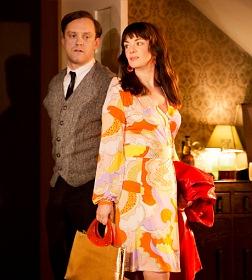Love, Love, Love
Starting in 1967, 'LOVE, LOVE, LOVE' spans a period of more than 40 years to chart the progress of two 'baby boomers' and their progeny. For those of you unfamiliar with the term, the 'baby boomer' generation is the one born during the period after World War II. Much blame has been laid at the door of this group, especially in relation to their opportunities and financial success which many would say they have singularly failed to pass-on to their children.
When we first meet Sandra and Kenneth they are both students at Oxford, but currently living in the swinging London of the 60s. Kenneth is encamped at his brother's flat, spending his days in his dressing gown and swilling down brandy. When his brother brings home his new girlfriend, Sandra, she is stoned but immediately falls for Kenneth. Some 20 years later, we find them married and living in Reading with their two teenage children, Jamie and Rose. Kenneth and Sandra have switched from brandy and pot to wine and cigarettes for emotional support, but are not content with their lot. When Sandra arrives late for her daughter's concert, the 'conversation' develops rapidly into divorce. We meet up with them again some 2 decades later with the parents living apart in comfortable retirement, but their children still dependent on them.
Written by Mike Bartlett and deftly directed by James Grieve, 'LOVE, LOVE, LOVE' was first performed in 2010 in Plymouth and toured in 2011. Mike Bartlett's script is well-observed, dryly witty and frequently vicious in its portrayal of the baby boomers. Sam Troughton is the broody, hard-working and slightly thuggish brother Henry who thinks Kenneth has it easy with a student grant that rivals his parents' income. Ben Miles excellently portrays a laid-back Kenneth whose eagerness to take full advantage of the newly-liberal society is matched only be his ability to drink alcohol. Claire Foy is the anguished Rose who attempts suicide in response to her parents divorce, and George Rainsford is the (initially) energetic Jamie whose obvious talents come to nought. But Victoria Hamilton really steals the show in a superb performance as Sandra, an eccentric, intelligent but ultimately unsympathetic woman who at times seems totally oblivious of the feelings of others, especially her own children.
You can read this play in different ways. If you take a literal view, then the message it conveys is a damning, unbridled condemnation of a spoilt-brat generation who had and have everything - nice things, houses worth a small fortune, great pensions - and whose self-indulgence rides rough-shod over the fate of their offspring. No doubt there will be many who will justifiably read it in that way. On the other hand, it might not be quite so simple as that. The last act seems to say something different because the set-up is that daughter Rosie wants her parents to buy her a house as she feels they persuaded her to 'follow her passion' to become a violinist from which she has made nothing and has no prospects, particularly in the making-money department. That suggests a generation who depend on their parents instead of carving-out a life of their own. Additionally, the whole piece has an exaggerated feel to it, and there's a distinctive, silky-red curtain which opens and close the action that has more in keeping with a game show or variety than serious drama. That makes me wonder if Mike Bartlett thinks the attacks on the baby boomers are overblown. I am still in two minds, though it is not as obviously clear-cut as it might first appear. Certainly worth seeing if only to make your own mind up.
"Piercingly funny play...though it sags at a couple of points, mainly has a lucid intensity."
Henry Hitchings for The Evening Standard
"An exciting evening, dart-sharp, horribly true."
Quentin Letts for The Daily Mail
Originally published on
